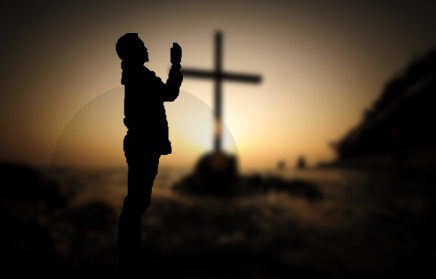Warren Buffett famously said: "When the tide fades, you know who was swimming naked." Although the “tide” of this coronavirus pandemic has not faded, there are signs that it is gradually fading away. We can breathe more comfortably after having been suffocated for so long. Yet this is the best moment for us to reflect on ourselves and be on guard that we are not like the "naked swimmers."
Looking back on the pandemic, throughout the outbreak it is amazing to see that we seem to have lost something, something precious. It is not something physical, but an awareness, an awareness from God. This consciousness has been blocked because internally we are accustomed to distress – what we are missing is the sense of repentance that every Christian should have.
The Church’s public gatherings have been temporarily suspended for nearly half a year. As a result, many pastors and believers are at a loss and have become “lost lambs.” Our culture, which pushes that thing called “worry" to the front of our thoughts and minds has come to dominate us. Most importantly, as the outbreak continues, our worries have increased and widened. We worry about the ravages of the pandemic; we worry about the patients affected by the pandemic; we worry about gatherings being suspended; we worry about the lack of funds in our churches; we worry about the pay for our pastors; we worry about losing congregations; we worry about the shortage of web tech staff; we worry about the quality of online fellowship; we worry about being unable to meet each other...
The string of worries comes one after another and never seem to end because we worry and worry, and the result is to worry some more. It is a vicious cycle that distresses us. The only way to solve our worries is to pray. Yet it is precisely the content of our prayers that proves the poverty and deep distress in our thoughts and mind.
Actually, it is not wrong to worry. It may even be appropriate to worry about God’s ministry; it is less wrong to pray because praying to God for everything is both the content of a Christian life and a demonstration of our faith in God as a Christian. The crux of the problem, however, is that our current sense of worrying is not from God but from an inertial consciousness inherited from our ancestors and imprinted in our minds. Because, this is an important part of Chinese traditional customs and culture, which has been admired by the sages of all generations. For example, there are famous saying like that of Mencius who said: "worrying makes you live, peace makes you die," or lyrics from Han musical compositions, "one’s lifetime exceeds a hundred years not, yet better one’s worrying is kept for ten centuries or more.” There is also the ancient poet Fan Zhongyan who said, "one’s priority in life is to worry the whole world's worries, what remains minor is to enjoy the world's joy;" and then the well-known catchy saying "you either worry for the future or now, no exception."
Worrying is a unique inheritance of Chinese culture, which deeply influences us in life and career. This seems to be justified. After all, our worries are manifested out of our love for Christ, for the Church, and for fellow believers. Anyway, our worry is about God's family and business.
But when we turn to the Bible and look at worrying from the Christianity perspective, we will discover this sense of distress is unnecessary and redundant because it is human-based – it is out of human consciousness. The more we worry the more distant we are from God. Think about it – the solution for those who face distress and are worrying is recognizing that they are relying on the wisdom and ability of mere humans. Even if there is occasional success, the celebration of the success is only about the glory of man. That pride in turn leads people to the path of self-centeredness. This naturally contributes to replacing dependence on God with reliance on man; God is completely abandoned.
Repentance is actually derived from the biblical concept of original sin and is out of awe and gratitude for God. As David said, "Then I acknowledged my sin to you and did not cover up my iniquity. I said, 'I will confess my transgressions to the Lord. And you forgave the guilt of my sin.'" (Psalm 32:5). Similar verses are common in the Bible. Because of this, the consciousness of repentance has become the main theme and norm in people's lives throughout Christian civilization. During the outbreak, we have witnessed that many people from countries where the Christian faith is dominant spontaneously kneel down in city squares and streets to pray for repentance.
But what is surprising is that in Chinese prayers of repentance there is a strong sense of distress. We constantly ask God to drive away from the pandemic or ask God to show pity to the affected people. It is as if God is our waiter ready to do whatever we ask.
They pray for repentance of their city, repentance from their deeds – they ask God for forgiveness and grace. Although this is related to the differences in social systems, the main difference is that between Christian civilization and Chinese ethnic culture. The content of prayers is a reflection of these differences. It is clear that the sense of distress has long been deeply rooted in our souls, but we are not aware of it.
Distress is human-centered whereas confession is God-centered. The awareness of distress depends on human ability whereas the consciousness of confession depends on the power of God. Distress is related to our sinful nature whereas repentance is linked to atonement. The two have different origins so the final results are bound to be different.
In countries where the Christian faith is dominant, the three most famous writings on confession are: Confessions by St. Augustine, Les Confessions by Rousseau, and A Confession by Leo Tolstoy. These three confessional texts are world-renowned not only for their literary values but also because people see the value of spiritual vitality of Christian faith, and see the potential impact that repentance will have on the development of society and civilization. These three confessions are different but they all derive from biblical truths.
Although confession is part of our national culture, there are differences in the nature of confession. Chinese confession is a reflection and remorse on our own mistakes or sins, and shows more sympathy towards the victims. However, confession in the Christian background is repentance of original sin and is complete humility before God. Worrying does not change the objective facts. Only repentance in the presence of God will change or even reverse the objective facts that have occurred. This is the power of God, unimaginable for finite man.
It cannot be denied that anxiety exists in the minds and souls of each Christian. This is a spiritual birthmark left to us by traditional culture. It will definitely not disappear immediately because we have the Christian faith. Instead, it will be ready to rub into our faith life and drive us toward the opposite side of our faith to keep us away from the light that God has shed on us.
During the outbreak, it is we who have lost or forgotten this precious sense of repentance so that some of us have chosen to glorify ourselves in the process of worrying. Some have left their original church. Some have fallen into heresy. Some have abandoned their pursuits and beliefs altogether.
God is wonderful. He allows our nation's excellent culture to continue and shine in history. On the other hand, God gives His eternal truth to those who are chosen by Him. If the former is out of God's universal grace, and the latter is out of God's special grace, then the chosen person should get across the grace of the present to accept the special grace given to us by God and reshape himself in the light of God's special grace.
Remember that whether it was Christ or John the Baptist, the first call and cry to the world from the beginning of their preaching was, "Repent for the Kingdom of Heaven is near," and there must be a strong awareness of the need for repentance.
This is also an important watershed in measuring whether Christians are true or false.
- Translated by Charlie Li












